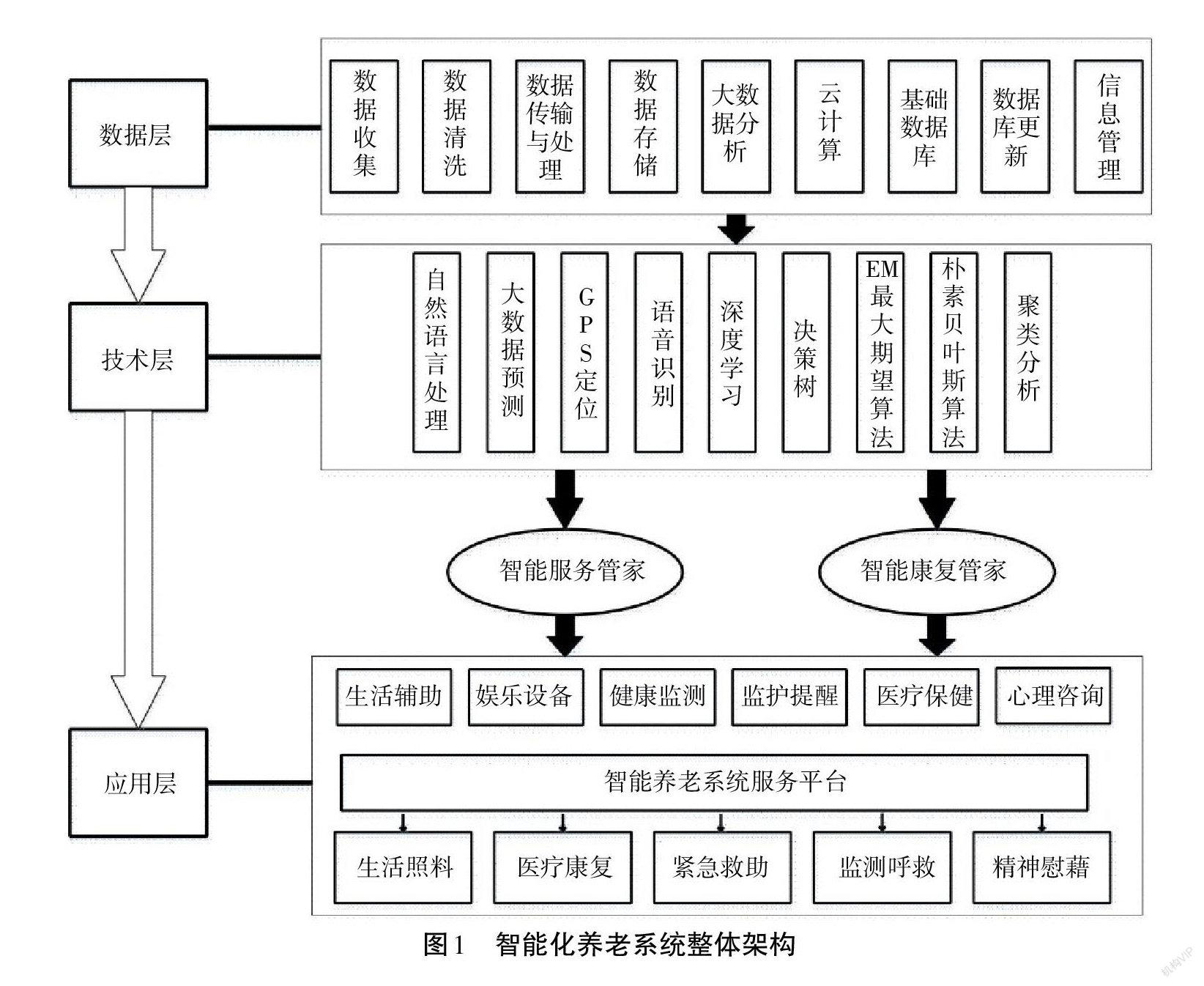面向智能服务的智能化养老系统研究
2021-09-26刘超霞
刘超霞

摘 要:伴随着社会的进步和经济的发展,以及国民生活水平的提高,新时代老年人的养老需求呈现出多样性、复杂性、特殊性等显性特征,这与养老产业的服务范围窄、内容单一、对象局限构成矛盾。人工智能技术为改善养老模式、建设智能养老系统产业提供了新机遇。本文结合智能养老的全新内涵,基于大数据和机器学习等智能技术,尝试构建由数据层、技术层、应用层构成的智能化养老服务系统,可提供智能生活照料、智能医疗康复、智能紧急救助、智能精神慰藉四项智能服务功能。
关键词:大数据;人工智能;智能养老;智能化;养老系统
中图分类号:F49;D669.6 文献标识码:A 文章编号:1003-5168(2021)24-0009-03
Research on Intelligent Elderly Care System Oriented to Intelligent Service
LIU Chaoxia
(Department of Computer Science in Binhai College Nankai University ,Tianjin 300450)
Abstract: With the progress of the social and the development of the economy, as well as the improvement of national living standards, the demand of the new generation of the elderly presents the obvious characteristics of diversity, complexity and particularity, which is in contradiction with the narrow service scope, single content and limited object of the pension service industry. Artificial intelligence technology provides new opportunities for improving the elderly care model and building an intelligent elderly care system industry. This paper combines with the new connotation of intelligent pension, based on intelligent technologies such as big data and machine learning, which attempts to build an intelligent pension service system consisting of data layer, technology layer and application layer so that to provide four intelligent service functions: intelligent life care, intelligent medical rehabilitation, intelligent emergency assistance and intelligent spiritual comfort.
Keywords: big data; artificial intelligence; intelligent pension; intellectualization; pension system
随着人口结构的改变,我国老年人口呈递增趋势,养老需求加剧。呈现出“未富先老”“未备先老”与“未富先骄”等局面,全社会养老负担重[1],养老问题日益严峻。养老服务是指针对老年人群的养护服务[2]。老年人需求的多样性、特殊需求的显性化[3]与养老服务产业服务范围窄、内容单一、对象受限形成矛盾[4],作为老龄化社会的基础性公共服务,该问题逐渐受到学术界和实践界的关注。当前,人类正处于新兴科技高速发展的新时代,如何利用新兴科学技术,构建智能化社区、提供智能化养老服务模式已经成为当前的热点话题。在党和国家政府的高度重视下,中国的养老服务事业改革与发展成就显著,但整体而言养老服务机制还不完善。我国机构养老服务标准体系仍处于初级阶段,对于重要标准的建立存在局限,机构内部的专业队伍不够健全,服务团队质量不高,医养结合养老服务仍需进一步发展。因此,有必要将人工智能技术与养老服务融合以促进智能养老服务的实现,助力我国智能化养老服务业的发展。
1 研究设计
1.1 研究思路
大数据技术、自动化技术、自然语言处理技术、机器学习等技术为智能化养老服务系统提供了坚实的理论基础,完善了智能化养老服务产业。一方面,数据的日益积累为数据分析提供先决条件。分析历史数据库中价值大的数据特征,建立和调整数据变化的预测模型,为人机互动提供基礎。人工智能结合多模态情感识别技术、图像识别技术等自动化技术,收集和识别人的生物信息,通过数据建模并持续优化模型,对未知的环境随机搜索并反馈结果。自然语言处理技术把知识转化成便于计算机存储和利用的某种数据结构的知识表达形式,实现机器学习。机器学习对人的思维和行为进行分析和模拟,实现人机互动。另一方面,人工智能技术使智能化养老服务系统具有高度协同性、高效性、及时性、预测性,应合理应用人工智能技术完善原有机构养老模式。首先是建立人工智能与养老机构基本的联结,其次是使用人工智能服务代替传统人工服务,加快建设智能机器人养老服务培训体系,制定智能机器人养老服务队伍建设的长期规划;最后是融合二者,优势互补,形成一种更符合老年人需求的养老模式。
